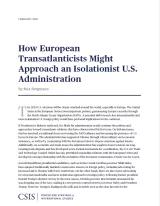No consistent picture has emerged yet as to how Kamala Harris would shape her foreign policy if she ends up being the next US president. Her time as Vice President gives at least some hints on how she might deal with China, the war in Ukraine, and policy in the Middle East.

Is Kamala Harris a transatlanticist? Will she continue to support Ukraine, as Joe Biden did? How committed is she to the multilateral order? What is her policy towards China? The coming weeks and months on the road will provide more insight into Kamala Harris’ approach to foreign policy, as she has dedicated much of her career so far to domestic issues.
While Harris took more than twenty trips abroad as Vice President and represented President Joe Biden at important international summits, such as ASEAN, she has not yet developed a clear foreign policy profile. This is partly due to the fact that, as Vice President, she is obligated to implement the U.S. President's agenda. However, the views of her foreign policy advisors may offer clues as to what we can expect to see from her on the international stage.
For starters, Kamala Harris is not expected to drastically upend the tenets of democratic U.S. foreign policy. Her foreign policy staff in recent years can be associated with the school of liberal internationalism, which supports a rules-based world order and largely reflects the democratic foreign policy consensus in Washington, D.C.
But if Kamala Harris were to move into the White House, the tone with which she represents U.S. values and interests in the geopolitical context could very well change. She may also be willing to make at least minor course corrections on issues where the views of a younger, diverse democratic electorate diverge from that of the foreign policy establishment, such as U.S. support for Israel’s war in Gaza.
The experience of Harris’ current National Security Advisor, Philip Gordon, should be reason enough for European leaders to breathe a sigh of relief. Before his current job, Gordon was responsible for Europe at the U.S. State Department under Barack Obama and later served as a Middle East policy advisor and coordinator at the White House. In his book "Losing the Long Game: The False Promise of Regime Change in the Middle East," he criticizes U.S. interventions in the Middle East, including those of his former boss Barack Obama.
Rebecca Lissner, Kamala Harris' Deputy National Security Advisor, sees the United States playing an active role in shaping an open world. In Lissner's view, the United States should neither rely on nationalist-isolationist reflexes nor indulge in nostalgia and the illusion that the United States is the only superpower. Before her promotion to Deputy National Security Advisor, Lissner was instrumental in drafting the 2022 National Security Strategy at the White House.
European security and support for Ukraine
It is unlikely that Kamala Harris will seamlessly follow in the footsteps of Joe Biden, one of the last old-school transatlanticists. Although she has repeatedly emphasized over the years America's "ironclad" commitment to NATO at the Munich Security Conference, Kamala Harris views the world differently than Joe Biden, partly due to her own background. Actively shaping the transatlantic relationship with Europe plays a secondary role for her, although Harris certainly sees and understands the value of the transatlantic alliance.
So far, her communication regarding the war in Ukraine has been almost identical to Joe Biden's, who has framed the war in the context of democracy versus autocracy. It remains to be seen whether Harris will deviate from Biden's official course in her views on U.S. support for Ukraine or paths out of the war. These uncertainties about Harris' transatlantic priorities and her relatively weak connections to European capitals stir unease among some observers.
One thing is certain: Regardless of who enters the White House in November, in the long term, the European NATO member states and the European Union must take on more responsibility for the security architecture and play a more active role in their neighborhood.
Middle East policy
In March 2024, Harris was one of the first high-ranking representatives of the Biden administration to call for a temporary ceasefire between Israel and Hamas. In her statements, she clearly sided with Israel and reaffirmed U.S. support. However, she also criticized the Israeli government's military approach in internal discussions and publicly referred to the situation in Gaza as a humanitarian catastrophe.
Senior advisors who have resigned due to Biden's Middle East policy are cautiously optimistic that Harris would focus more on the human rights of Palestinian civilians than Joe Biden has. Whether she finds a nuanced language will likely be revealed in the coming months during the election campaign, as she needs to appeal to many of the more progressive, younger voters in swing states like Michigan, Wisconsin, and Georgia to secure a path to win.
Harris' voting record in the U.S. Senate suggests that she is critical of close cooperation with Saudi Arabia. For example, she voted against U.S. support for the Saudis in the Yemen war and rejected arms sales. Philip Gordon is known as a negotiator and supporter of the Iran nuclear deal (JCPOA), which came into effect in 2015 but from which the U.S. withdrew in 2018 under President Donald Trump.
China
Harris has taken an assertive stance on U.S. relations with China both as a senator and as Vice President. While she criticized Trump's trade war and considered his tariffs harmful to the U.S. economy, she clearly supports the policy of "de-risking." As a senator, she advocated for legislation to strengthen human rights in Hong Kong and sanction those responsible for human rights violations in Xinjiang. She met with China's President Xi Jinping in November 2022 at the APEC Leaders Retreat, where she urged him to keep communication channels open to manage the competition between the two countries responsibly. Additionally, Harris has voiced her support for Taiwan, particularly in light of growing military threats from China.
Latin America
During her time as Vice President, Kamala Harris was entrusted by Joe Biden with the migration agenda. However, she struggled to distinguish herself in this policy area and faced criticism from both Republicans and progressive voices within her party. As a result of the portfolio she was handed, she spent a lot of time strengthening ties with political representatives from Central America. For example, she invited Guatemala's newly elected progressive social-democratic president, Bernardo Arévalo, to the White House to support his anti-corruption agenda in the face of an authoritarian government. Surprisingly, Harris' overall mixed record on migration policy is unlikely to harm her electability with Latino voters: she has historically received above-average support from this demographic. Since announcing her candidacy, several important Latino organizations have already endorsed her.
India
Kamala Harris' connection to India through her mother’s roots has led her to criticize the Indian government directly as a senator, for example, by meeting with the diaspora from the Kashmir region. During her time as Vice President, she moderated her stance, since India has become too important of a U.S. ally against China. President Narendra Modi does not seem to have held her past criticism against her; after all, he praised her during his last state visit in 2023.
Personnel choices are key
Kamala Harris has gained some foreign policy experience alongside Joe Biden in recent years. Still, her focus so far has been on domestic issues, which means that many of the principles for Harris' foreign policy would fall to her team to develop. If she wins, it will be interesting to see whether former Biden advisors fill the crucial foreign policy positions or whether she is willing to consider new approaches, such as a more holistic understanding of foreign and security policy—linked to issues like climate, human rights, and democracy— and chart a new path for American foreign policy.
This article first appeared here: us.boell.org


